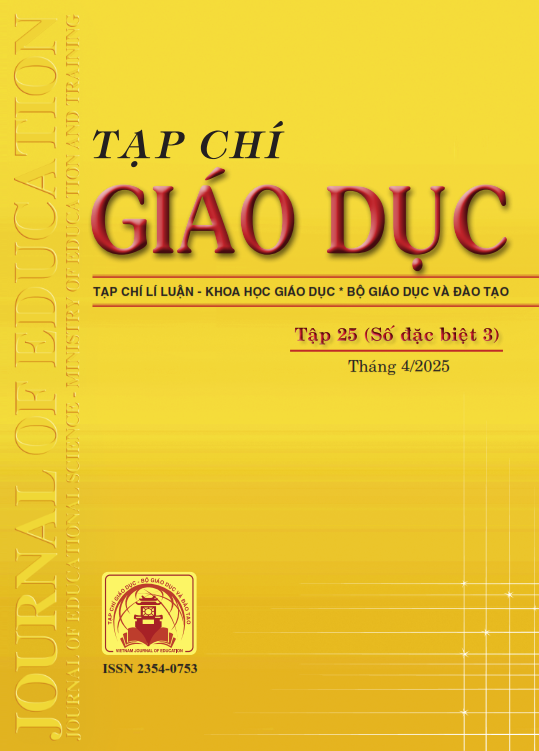Xây dựng khung đánh giá trách nhiệm đối với vấn đề văn hóa, xã hội của học sinh trung học cơ sở
Tóm tắt
The 2018 general education program has identified “responsibility” as one of the five core qualities that need to be formed and developed for students. This reflects the goal of education to train responsible citizens who are willing to make positive contributions to the community and society. However, currently, the assessment of students' responsibility for cultural and social issues in teaching at all levels of general education has received little research attention. The objective of this study is to build a theoretical framework for assessing the responsibility of secondary school students in solving cultural and social issues. Using theoretical research methods and expert consultation methods, the study has built a theoretical framework on responsibility for cultural and social issues of secondary school students, including 4 components and 14 behavioral indicators. The results of the study can provide teachers with a useful reference for developing assessment tools for cultural and social responsibility for secondary school students in different subjects.
Tài liệu tham khảo
Alsaeed, H. (2022). The role of public education schools in developing social responsibility in the light of contemporary global trends. Creative Education, 13(9), 2754-2780.
Arslan, G., & Wong, P. T. P. (2021). Measuring Personal and Social Responsibility: An Existential Positive Psychology Approach. Journal of Happiness and Health, 2(1), 1-11. https://doi.org/10.47602/johah.v2i1.5
Bộ GD-ĐT (2018). Chương trình giáo dục phổ thông - Chương trình tổng thể (ban hành kèm theo Thông tư số 32/2018/TT-BGDĐT ngày 26/12/2018 của Bộ trưởng Bộ GD-ĐT).
Conrad, D., & Hedin, D. (1985). Instruments and scoring guide of the experiential education evaluation project. Service Learning, General, 247.
Đảng Cộng sản Việt Nam (2021). Văn kiện Đại hội đại biểu toàn quốc lần thứ XIII. NXB Chính trị Quốc gia - Sự thật.
Giddens, A. (2004). The constitution of society: Outline of the theory of structuration: Elements of the theory of structuration. In Practicing history (pp. 121-142), Routledge.
Hoàng Phê (chủ biên), Vũ Xuân Lương, Hoàng Thị Tuyền Linh, Phạm Thị Thủy, Đào Thị Minh Thu, Đặng Thanh Hòa (2008). Từ điển tiếng Việt. NXB Đà Nẵng - Trung tâm Từ điển học.
Mason O’Connor, K., & McEwen, L. (2021). Real world learning through civic engagement: Principles, pedagogies and practice. In Applied Pedagogies for Higher Education (pp. 63-89). Palgrave Macmillan, Cham.
Milne, C. (2014). Cultural influences on science education. In Encyclopedia of Science Education (pp. 1-5). Springer, Dordrecht.
Stevenson, A. (2010). Oxford dictionary of English. Oxford University Press.
Tylor, E. B. (1871). Primitive Culture: Research into the Development of Mythology, Philosophy, Religion, Art, and Custom (volume 1, p. 1). London: John Murray.
Whitelegg, E., & Parry, M. (1999). Real-life contexts for learning physics: Meanings, issues and practice. Physics Education, 34(2), 68-72. https://doi.org/10.1088/0031-9120/34/2/014
Đã Xuất bản
Cách trích dẫn
Số
Chuyên mục
Giấy phép

Tác phẩm này được cấp phép theo Ghi nhận tác giả của Creative Commons Giấy phép quốc tế 4.0 .












